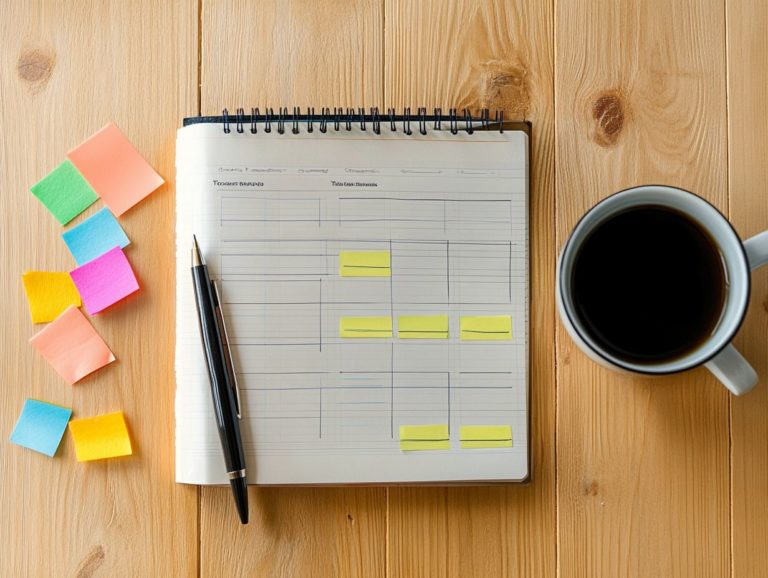“Effective To-Do Lists for Students: A Guide”
In the fast-paced world of academia, staying organized can feel like a Herculean task. However, the trusty to-do list emerges as a simple yet immensely powerful tool that can significantly enhance your productivity and reduce stress.
This article delves into the myriad benefits of to-do lists and offers strategies for crafting and organizing them effectively. You will also discover the best tech tools designed to streamline your tasks.
You will find invaluable tips to conquer procrastination and maintain motivation throughout your studies.
Get ready to take charge of your academic success!
Contents
- Key Takeaways:
- The Importance of To-Do Lists for Students
- Creating an Effective To-Do List
- Organizing Your To-Do List
- Utilizing Technology for To-Do Lists
- Tips for Staying Motivated and Consistent
- Frequently Asked Questions
- 1. What are the benefits of using an effective to-do list as a student?
- 2. How can I create an effective to-do list as a student?
- 3. Is it better to use a physical or digital to-do list?
- 4. How often should I update my to-do list?
- 5. Should I include non-academic tasks on my to-do list?
- 6. How can I ensure that I stick to my to-do list?
Key Takeaways:

- The use of to-do lists has a positive impact on student productivity and organization.
- An effective to-do list should include key elements such as important deadlines and break tasks into smaller, manageable chunks.
- Organizing tasks into categories and prioritizing them can help students stay on track and manage their time effectively.
- Technology can be a helpful tool for creating and managing to-do lists, with various apps and tools available specifically for students.
- Staying motivated and consistent with using to-do lists can be achieved by overcoming procrastination and maintaining momentum through setting achievable goals and rewarding progress.
The Importance of To-Do Lists for Students
To-do lists are invaluable tools for your organization as a student. They give you the power to navigate your academic journey with heightened productivity and refined time management strategies.
By prioritizing your tasks and leveraging organizational resources, you can ease stress and cultivate a sense of responsibility for your own tasks that drives significant progress.
Embracing developing good study habits and employing checklists can simplify your daily responsibilities. This turns an overwhelming workload into manageable tasks that pave the way for academic achievement.
Benefits and Impact on Productivity
To-do lists do more than help you check off tasks. They boost your productivity by helping you prioritize and stay accountable.
By breaking larger academic projects into smaller, manageable tasks, you can create a clear pathway to your goals. This ultimately helps reduce feelings of overwhelm.
For instance, if you re facing an upcoming exam, you might list out specific study topics and allocate time blocks for each, ensuring you cover all material in a systematic manner.
Your to-do lists can also include deadlines for assignments and personal commitments, helping you maintain a balanced schedule. This approach not only prevents last-minute cramming but also cultivates a sense of accomplishment as you check off tasks, leading to lower stress levels.
Daily or weekly reviews help you reassess your goals, enhancing your overall effectiveness in achieving both short-term and long-term academic objectives.
Creating an Effective To-Do List
Crafting an effective to-do list is essential for you as a student. It acts as a strategic roadmap for navigating your daily responsibilities, academic tasks, and personal commitments.
By integrating clear task descriptions and leveraging a planner, you can categorize your tasks into manageable sections. This not only streamlines your workload but also fosters a structured approach to managing your time effectively.
Key Elements and Strategies

Key elements and strategies for crafting an effective to-do list revolve around habit coaching, consistent task reminders, and the strategic organization of resources to ensure you make meaningful progress throughout your academic journey.
Embracing habit coaching can empower you to establish a rhythm, enhancing your productivity and fostering accountability. When paired with consistent task reminders, it creates an environment where your tasks effortlessly blend into your daily routine, ensuring nothing slips through the cracks.
Organizing your resources can turbocharge your workflow and help you focus on your goals! Whether you categorize materials by subject or use digital tools for enhanced accessibility, a well-structured approach significantly contributes to maintaining your momentum.
This thoughtful strategy ultimately transforms overwhelming workloads into manageable tasks, making your journey toward academic achievement not only smoother but also more rewarding.
Organizing Your To-Do List
Organizing your to-do list is essential for maximizing efficiency. It gives you the power to categorize tasks and manage multiple lists simultaneously, significantly streamlining your project planning.
By using tools like Todoist projects, you can effortlessly navigate through your diverse academic and personal commitments. This way, you ensure that no task slips through the cracks and that every deadline is met with precision.
Using Categories and Prioritizing Tasks
Using categories and prioritizing tasks effectively can significantly elevate your academic performance, particularly during high-stakes moments like exam preparation or when juggling reading schedules and recurring assignments.
By adopting a systematic approach to task management, you can clearly pinpoint your most pressing responsibilities, allowing you to optimize both your time and energy. A highly effective strategy is to classify tasks into three distinct categories:
- Urgent and important
- Important but not urgent
- Tasks that can wait
This method not only helps you visualize your priorities but also allows you to tackle ongoing assignments or study materials by breaking them down into smaller, more manageable components, which can ease the pressure of impending deadlines.
When preparing for exams, crafting a dedicated study plan that allocates time for each subject can significantly enhance retention and ensure that you cover all necessary material, ultimately boosting your overall academic success.
Utilizing Technology for To-Do Lists
Harnessing technology for your to-do lists can elevate your time management skills to a whole new level. Tools like digital calendars, Todoist, and Google Calendar come equipped with innovative features that simplify task management and offer a clear overview of your responsibilities.
By incorporating these digital resources into your routine, you can effortlessly stay on top of your commitments, enjoying the perks of reminders that pop up automatically on your devices and tracking capabilities.
Best Apps and Tools for Students

Among the top apps and tools for students, Todoist truly shines as a powerful digital task manager. Its impressive features, like attachment capabilities and a user-friendly interface, simplify your task management process.
With its intuitive design, you can easily categorize tasks by subjects or projects, making it a breeze to prioritize your workload. The app effortlessly integrates with various calendars, allowing you to sync deadlines and appointments without a hitch.
If you’re looking for alternatives, Trello is an excellent tool that uses cards and boards to help you manage tasks visually, especially for organizing group projects by assigning tasks to team members. Meanwhile, apps like Evernote are invaluable for note-taking, enabling you to capture ideas and lecture notes in a well-organized manner.
These applications not only boost your individual productivity but also promote collaboration with your peers, helping you stay on top of your academic responsibilities. Start organizing your to-do list today and see how much more you can achieve!
Tips for Staying Motivated and Consistent
Staying motivated and consistent in managing your to-do lists is essential, particularly as you juggle life, social commitments, and academic responsibilities.
By using helpful strategies to stay motivated and cultivating a sense of accountability, you can significantly enhance your study habits.
This approach not only streamlines your tasks but also gives you the power to thrive in both your personal and academic endeavors.
Overcoming Procrastination and Maintaining Momentum
Overcoming procrastination is crucial for students like you who are striving for success. Procrastination means putting off tasks or waiting until the last minute to do them, which hampers personal growth and the achievement of your academic goals.
Reflection questions can be an invaluable tool for pinpointing the reasons behind your procrastination and discovering effective solutions. They help you sustain your momentum.
These questions encourage you to examine your behaviors and can reveal hidden fears or distractions that may be obstructing your path.
Setting specific, measurable goals and diligently tracking your progress can significantly boost your motivation. When you break down tasks into smaller, manageable segments and regularly assess your accomplishments, you cultivate a sense of accountability.
This approach tackles procrastination and helps you improve continuously.
This comprehensive method equips you with the essential tools for long-term success.
Frequently Asked Questions
1. What are the benefits of using an effective to-do list as a student?

Using an effective to-do list can help you stay organized, prioritize your tasks, and increase productivity. It can also reduce stress and prevent you from forgetting important deadlines or assignments.
2. How can I create an effective to-do list as a student?
Start by listing all of your tasks and assignments for the day or week. Then, prioritize them based on importance and urgency.
Be sure to also include specific deadlines and break down larger tasks into smaller, more manageable ones.
3. Is it better to use a physical or digital to-do list?
This ultimately depends on personal preference. Some students prefer the tangible aspect of a physical to-do list, while others find digital lists more convenient and accessible.
Experiment with both methods to find what works best for you.
4. How often should I update my to-do list?
It is recommended to update your to-do list daily or at the beginning of each week. This will help you stay on top of any changes or new tasks that may arise.
5. Should I include non-academic tasks on my to-do list?
Yes, it can be beneficial to include non-academic tasks on your to-do list in order to balance your responsibilities and maintain a well-rounded schedule.
This can include chores, extracurricular activities, or personal goals.
6. How can I ensure that I stick to my to-do list?
One way to stick to your to-do list is to set realistic goals for each day and avoid overloading yourself with too many tasks.
It can also be helpful to reward yourself after completing a certain number of tasks or crossing off a particularly challenging task from your list.
Start now and see the difference!






